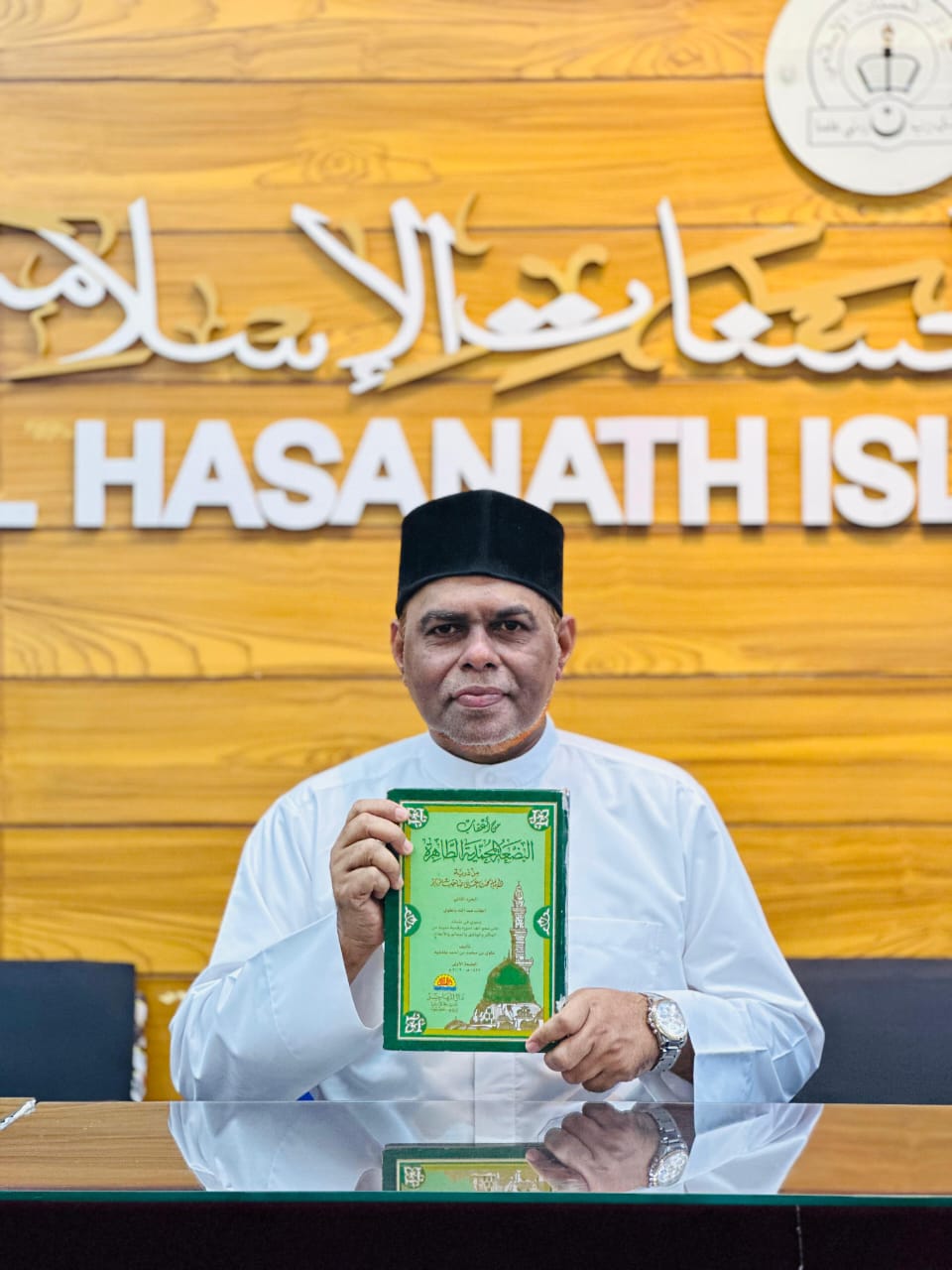Sacred Genealogy: A Scholar's Discovery
As Samastha Kerala Jam’iyyathul Ulama marks its centenary, the legacy of Sayyid Varakkal Mullakoya Thangal is being revisited with renewed reverence.
This eminent spiritual luminary of Kerala is now viewed in a new historical light, thanks to recent genealogical research that corrects longstanding inaccuracies and establishes his authentic lineage.
At the forefront of this discovery is Sayyid Ali Ba’alawi Nadwi, Principal of Darul Hasanath, Kannadiparamba, and son of the late Sayyid Hashim Baʿalawi Kunji Thangal, former Kannur Qadhi and founder of Darul Hasanath. His meticulous scholarship has challenged entrenched assumptions and re-examined genealogical archives, culminating in a breakthrough moment: the unearthing of the lineage from a Hadrami manuscript titled Min ʿAqābil Bidʿatil Muḥammadiyyah aṭ-Ṭāhira min Dhurriyyati Imām Muḥammad bin ʿAlī bin Ṣāḥib Mirbāt.
This critical source, tracing the Prophet’s noble descendants, has enabled the reconstruction of Sayyid Varakkal Mullakoya Thangal’s authentic genealogical chain, reaffirming his exalted Prophetic descent. The research has also received international scholarly validation, with Dr. Husayn Hamid Baʿalawi, Professor at the Central Islamic University of Yemen, endorsing its authenticity.
Speaking to The Evident in an exclusive interview, Sayyid Ali Baʿalawi Thangal reflects on the academic journey, the spiritual motivations behind his work, the discoveries that reshaped historical understanding, and the enduring significance of Mullakoya Thangal’s legacy for Kerala’s Muslim community and beyond.
Q: Discovering the genealogical lineage of Varakkal Sayyid Abdurahman Ba'alawi Mullakoya Thangal was a significant scholarly achievement. How do you believe this historical milestone should be understood within the spiritual fabric of Malabar?
A: From Prophet Muhammad's (pbuh) earliest days, Malabar has been touched by sanctity. The region witnessed the Şahābah, who laid foundational spiritual layers. This legacy was carried forward by Sufis, Makhdooms, Bukharids, and particularly Hadhramids from Yemen—torchbearers of Sufi ṭarīqāt. Mamburam Quthbuzzaman Sayyid Alavi Mouladhaveela Thangal (d. H 1266), with his son Sayyid Fadhl Pookoya Thangal (d. H 1240), the Panakkad Shihabuddin Sayyids, and the Ba'alawi Sayyids stand out in Kerala's political, social, and cultural fabric. Other families like Jifri, Aidroosi, and Mashhoor can also be mentioned.
Among the spiritual practices introduced, none resonated deeper than Ratib al-Haddad, becoming Malabar's defining devotional feature. The presence of Sayyid Abdullah bin Alawi al-Haddad's (d. H 1044) disciples from Hadhramaut solidified these ties.
This discovery reaffirms that Haddad and Ba'alawi Sayyids emerged from shared spiritual and genealogical origins. It clarifies that many Sayyid families perceived as distinct qabīlahs actually trace their ancestry to Şahib Mirbāt, Sayyid Muhammad bin Alī al-Ba'alawi (d. H 556). Ba'alawi, often misunderstood as a general title, denotes a specific noble lineage. This milestone isn't merely scholarly—it's a rediscovery of roots that enriches Malabar's spiritual fabric.
This research revealed valuable insights:
- Recognition of Varakkal Sayyid Abdurahman Ba'alawi Mullakoya Thangal's (d. H 1351) complete lineage in a prominent Arab scholar's work on the Hadhrami Sayyids' lineage—a golden scholarly achievement. Even the author of that work did not recognize him as the founder of Samastha Kerala Jam'iyyathul Ulama.
- Establishing that Varakkal Sayyid belongs to Prophet Muhammad's 35th generation.
- Discovering that the Varakkal Thangals descend from the 7th-century mujaddid, Sayyid Abdullah Ba'alawi (d. H 731).
- Affirming that the family belongs to Ālu Hamid Ba'alawi (d. H 1070), caretakers of Tarim's historic Ba'alawi Masjid.
- Finding that Varakkal Sayyid's grandfather, Sayyid Ali Hamid Ba’alawi, was Imam Abdullah ibn Alawi al-Haddad's disciple.
- Establishing that Sayyid Varakkal's eighth forefather, Sayyid Habeeb Umar Ba’alawi's (d. H 1020) daughter, Salma (d. H 1073), was Imam Abdullah ibn Alawi al-Haddad's grandmother.
- Uncovering Arakkal family ties: Sayyid Muhammad bin Umar Bäfaqīh (d. H 1090) reached Kannur in the 17th century and married the daughter of Abdul Majeed, a minister of the Arakkal royalty. His sister, Fathima Beevi, mothered Sayyid Hamid Ba’alawi (d. H 1070), Varakkal Sayyid's paternal grandmother.
- The family was known as Ālu Hamid Ba'alawi even in Hadhramaut.
- Hadhrami genealogists and Yemeni families authentically approved this lineage.
Furthermore, two Ba'alawi Sayyid families exist in Kerala, as mentioned in ar-Rawdh al-Jaliyy and 'Aqabu 'Abdillah Ba'alawi (the second volume of Min Aqabil Bid'atil Muhammadiyyah at-Tahira). They are known within the Ba'alawi qabīla itself and descend from the 7th-century mujaddid, Sayyid Abdullah Ba'alawi, who was the son of Sayyid Alavi (d. H 669), the son of Sayyid al-Faqih al-Muqaddam (d. H 653):
- The Ālu Hamid Ba'alawi Sayyid family (including Sayyid Abdurahman Ba'alawi Varakkal Mullakoya Thangal).
- The Panayathil Ba’alawi Sayyid family from Ālu Sayyid Muhammed (d. H 973), son of Sayyid Alavi (d. H 918), son of Sayyid Ahmed Ba’alawi Sahib Qasam (d. H 891). This includes Panayathil Sayyid Muhammed Abdul Wahab Ba'alawi, whose lineage was also found in the aforementioned book.
Panayathil Sayyid Muhammed Abdul Wahab Ba'alawi, the founder of the Panayathil mosque, reached Parappanangadi Panayathil in H 1195 and died in H 1243. He was from the Kallapalli Shaikh's lineage—Sayyid My-Alavi ibn Ba'alawi, who reached Kerala in the 10th century Hijri from Qasam, Hadhramaut, Yemen, as the son of Sayyid Muhammed Ba'alawi (d. H 973). Their descendants became the Panayathil Ba'alawi Sayyids. I also worked on a complete history and lineage describing the Panayathil Sayyids in a work titled Al-Jouhar al-Ghaali min Siyari Saadathi Aali Ba'alavi.
As a matter of fact, Sayyid Abdurahman Ba'alawi Mullakoya Thangal's lineage has come to light and has been approved by his own family of Ālu Abdillah Ba'alawi.
Q: What initially drew you to genealogical studies, and how did your research lead to the discovery of Sayyid Varakkal Mullakoya Thangal's lineage?
A: My revered father drew me to genealogical studies. When my grandfather, Sayyid Hamid Ba'alawi (d. H 1402), gifted him Tafsir al-Jalalayn, the title page showed his father's name—Panayathil Sayyid al-Hafiz Ali Ba'alawi Kunji Thangal (d. H 1347)—followed by "Ba'alawi," linking our ancestral lineage. Curious, my father inquired. When this was mentioned to Madavoor Sheikh (d. H 1411), he responded with conviction: "It is true, and you will eventually find it." This statement became pivotal. Our family's curiosity evolved into a structured genealogical investigation.
In 2016, I met Dr. Muhammad Aboobacker Baadeeb, a prominent scholar visiting Kerala. Through our Arakkal Palace meeting (August 26), I accessed Yemeni nasab (genealogy) networks. In 2017, through a friend, Muhammad Aslam, in Madinah, I was gifted the second volume of a pivotal manuscript: 'Aqabu 'Abdillah Ba'alawi, part of Min Aqabil Bid'atil Muhammadiyyah at-Tahira. It was published by Dar al-Muhajir in Madinah in 2006 by the author, Sayyid Habeeb Alavi Balfaqeeh, through his son, Sayyid Abdullah Balfaqeeh. Through expanding networks and manuscript study, I identified ambiguity in Sayyid Varakkal Mullakoya Thangal's lineage beyond his fourth ancestor. During Samastha's centennial, his legacy gained interest. When genealogists provided no reliable response due to earlier errors, as a Ba'alawi, I was asked. I revisited manuscripts and—by Allah's grace—arrived at a conclusive, authenticated discovery. On June 16, 2025, at Hasanath Grand Masjid, the complete lineage was recited. A detailed report was published on June 30 in Suprabhaatham daily. Later, on Wednesday, September 2, 2025 (10th Rabi' al-Awwal), during a majlis at the same mosque with Sayyid Aslam al-Mashhoor present, two books were released on the research—Thulu' ash-Shams (Arabic) and The Dawn of History (Malayalam).

Q: It is said that your reading habits played a key role in this discovery. Could you share how they shaped your journey?
A: My reading habits were deeply influenced during my teenage years by my grandfather, Shaikh Hasan Hazrat (d. H 1402), the first Keralite principal of Vellore's Baqiyat Salihat Arabic College and a renowned hadith scholar. His passion for learning inspired me profoundly. Later, Darul Uloom's extensive library—among India's largest—enriched my reading discipline. Access to rare works and global texts shaped my scholarly foundation. My experiences with genealogical inquiry refined my reading, directing it toward specific sources. Even after uncovering my own lineage, my passion for genealogy continued. Observing mistakes made by local historians made me more determined to ensure accuracy. I sourced rare works from book fairs. Among them was ar-Rawd al-Jaliyy by Sayyid Murtada al-Zabidi (d. H 1205). I accessed it before reaching Yemen, earning the appreciation of the Hadhrami Sayyids. I obtained soft copies of rare books through my connections with Arab scholars and genealogists. When studying the Varakkal Sayyids' lineage, my routine shifted to the early mornings—beginning with ṣalāh, tawassul upon the Prophet, and Puratheel Ghaus-ul-Azam Shaikh Abdul Qadir Al-Thani al-Suhrawardi (d. H 983), followed by focused genealogical reading. This spiritual-scholarly blend sustained my dedication.
Q: How have your spiritual connections supported or influenced your work in genealogical research?
A: From an early age, my father took me to visit great scholars and revered Sufis. Those visits were immense blessings—being with spiritual luminaries and visiting their maqāms left deep impressions.
Among those who profoundly influenced me were visits to Kakkiduppuram Ustad and Shamsul Ulama (d. H 1417). I recall my father's close friend, Hāji Mahīn Shah's, lasting impact—a man of spiritual depth. Madavoor Sheikh's spiritual foresight and encouragement served as a guiding light throughout the research. His words and presence inspired every stage. Through these deep spiritual connections—with Sufi saints and esteemed scholars—I found the motivation and clarity for these genealogical milestones.
Q: What advice would you offer to historians working on genealogical studies, especially considering the errors identified in some earlier works?
A: Genealogy isn't just history—it's a sacred science that should never be approached casually. Genealogical studies require specialized knowledge and precision; genealogists must embody essential moral and spiritual qualities:
- Taqwa (God-consciousness)
- Ikhlāṣ (sincerity)
- Thawab (steadfastness)
- Amānah (trustworthiness)
- Ṣidq (truthfulness)
Beyond these virtues, genealogists need deep expertise in multiple scholarly disciplines:
- Asl (ancestral origins)
- Istilāhāt (technical terminologies)
- Masādir (primary sources)
- Tabaqāt (generational and biographical classifications)
Moreover, it must never be pursued for financial gain, organizational status, or by those lacking the necessary qualifications and spiritual integrity. Any genealogical work must be thoroughly verified and approved by recognized genealogical scholars—especially from the Arab world who are trained in this specialized science.
As scholars say:
- "اعملوا، فكل ميسر لما خلق له" - "Act, for everyone will be guided to do that for which he was created."
- "من تكلم في غير فنه أتى بالعجائب" - "Whoever speaks outside his expertise makes strange errors."
- "لكل فن رجال" - "Every discipline has its specialists.”
These principles should guide every historian, especially those dealing with sacred genealogical heritage.

